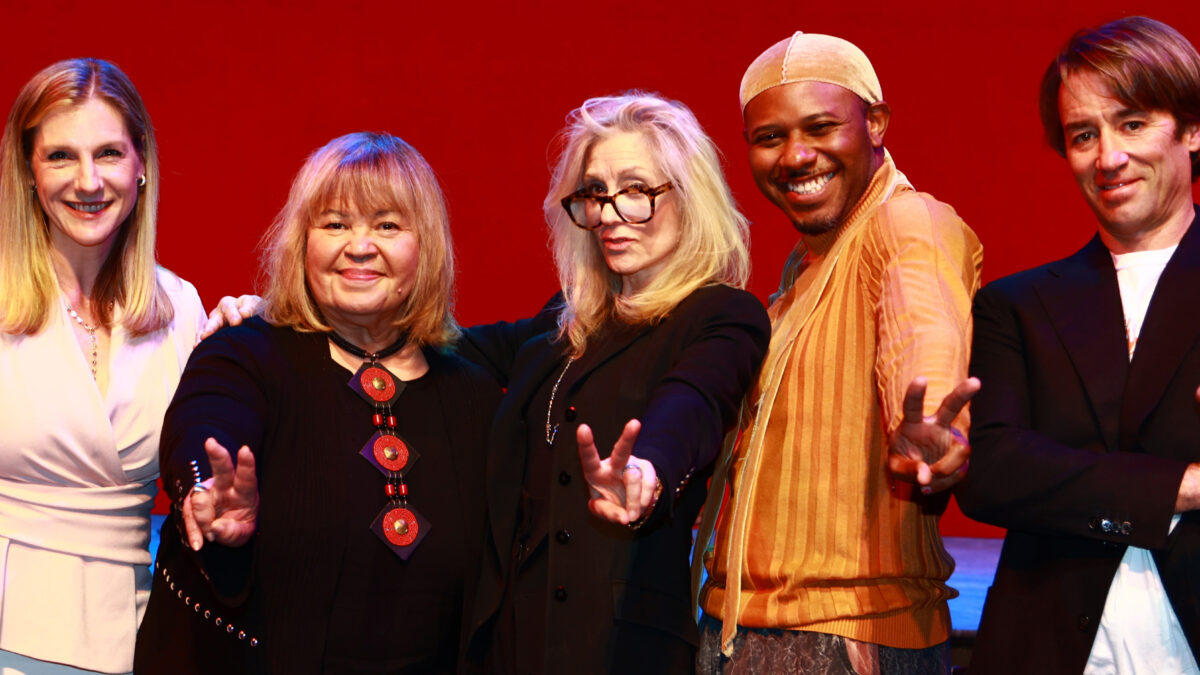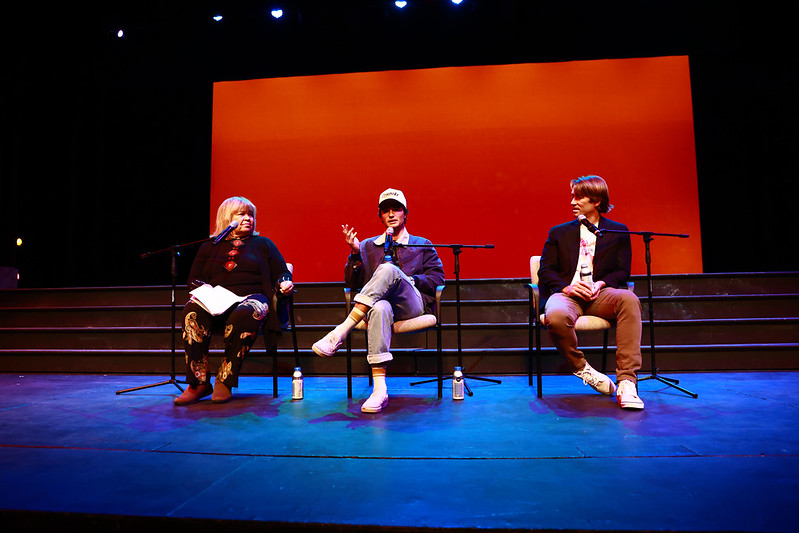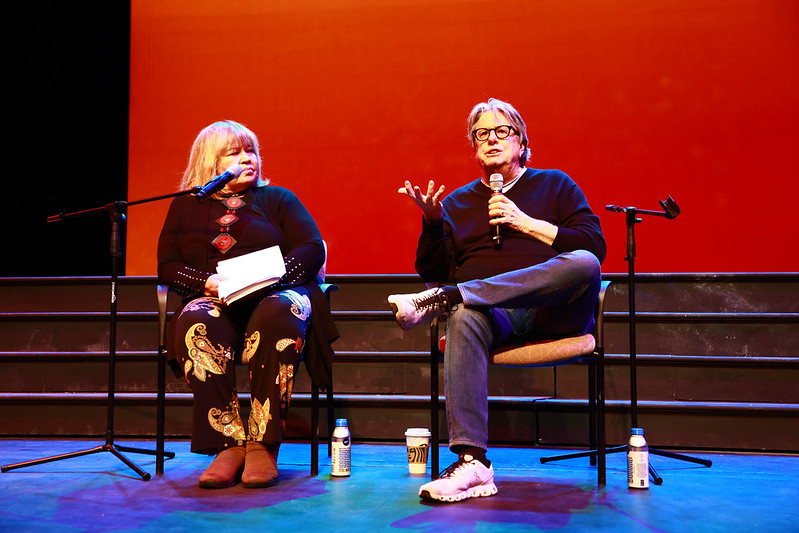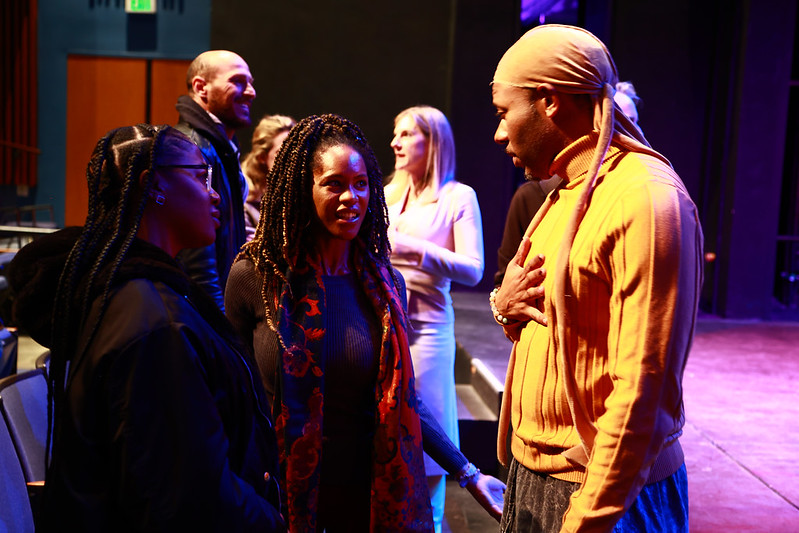
In early February, a constellation of industry superstars gathered to discuss the importance of protecting mental health in their ultracompetitive and high-stress industry for the sixth installment in SDA’s Multihyphenate Masterclass series. Outer Banks producer Jonas Pate and series lead Chase Stokes, Hollywood writer and director (and USC alum) Andy Tennant, award-winning writer/director Larry Powell, and acting legend Judith Light rounded out three panels moderated by SDA Professor Michele Shay. Each of the panel participants shared their unique perspective on the balance between protecting one’s mental health and giving your all in an industry that is notorious for encouraging people to “do whatever it takes” to make it.
The first panel featured a discussion with Jonas Pate and Chase Stokes, who work together on the hit Netflix series Outer Banks. Stokes, who spends a great deal of time volunteering for and promoting the mental health advocacy group Bring Change to Mind, discussed his own difficult and harrowing journey to success in the entertainment industry.
“I knew that the reality of making this an actual career was very slim, so I knew I had to make some very irrational choices,” Stokes said.
He admitted that these choices at times were not the most supportive for his own mental health. His experience with this balancing act led him to get involved with Bring Change to Mind, which provides outlets for high school students to talk about their mental health struggles and provides resources to help.
“I looked back at when I was going through the high school and college experience, and I think: were there any outlets for me?” Stokes recalled. “There really weren’t.”
Series producer and screenwriter Jonas Pate agreed, crediting resiliency as the secret ingredient to his success in a sometimes-brutal business.
“Resiliency helps,” Pate said. “You’re going to get kicked in the teeth a lot. You’ve got to get used to that. You’ve just got to get back up.”

The six-month dinner party
The second portion of the masterclass featured a one-on-one conversation between Shay and Andy Tennant (BA ‘77), director of Hollywood hits like Hitch, Sweet Home Alabama, and Ever After. Tennant candidly discussed the difficult problems working in the industry can pose for mental health and encouraged young actors to find a life outside of the industry to achieve balance.
“There’s working out, there’s taking a hike, there’s all kinds of things. If you’re surrounded all the time by like-minded actors and writers, you need to be careful that you don’t spin yourself into a frenzy,” Tennant said. “The beauty is, when you do have a broader spectrum in your life, you become more interesting, and acting becomes part of your life, not your whole life.”
He also emphasized the virtues of simply being a kind, well rounded person, and the importance of showing an interest in other people. Tennant described film shoots as something like a “six-month dinner party”—an idea that resonated with the audience and came up again and again in the question and answer sessions that followed—and revealed that, as a director, he would prefer to work with someone reliable and easy to work with than to be stuck with an extremely talented ego. “[Y]ou need to be a grown up. You need to care about everybody else,” Tennant said. “You have to actually ask questions, like ‘How was your day? How are you?’”

We will take care of our own
The final portion of the masterclass featured award-winning actress Judith Light, writer/director Larry Powell, and Professor Shay. The three held back tears at the reunion: Shay and Light were college roommates, and Shay worked closely with Powell as he navigated his transition into the film industry.
Powell discussed the impact of the Black Lives Matter protests on his work. He comes from a long line of activists, and revealed that he wanted to use his art as an entry point into making a difference.
“My art is my way in,” Powell said.
Powell talked about the profound influence sobriety had on his being able to successfully make art. His award-winning film Mother’s Milk: A Film Quilt started off as a play, and as Powell performed around the country, he began to film scenes in bits and pieces using different actors as the lead. The final piece, Mother’s Milk, went on the win the New American Cinema Special Jury Prize at the 2021 Seattle International Film Festival.
Light then focused on her activism for the LGBTQ+ community during the AIDS crisis of the 70s, 80s and 90s. She discussed at length the power of community, and the power of service in the lives of individual artists.
“You could tell that the [lack of support for HIV victims] had to do with the level of homophobia that was living in the culture,” Light said. “And because people were homophobic, you couldn’t get them to move. So the community moved. The community said, ‘We will take care of our own. We will do this.’”
Light talked about coming to a place in New York when she did not know how to move forward, and spoke candidly about discovering therapy and throwing herself into both her work and her service.
“I’d been going around talking about how the queer community had inspired me—their authenticity, who they are,” Light recalled. “And I said, ‘I’m just talking the talk, but I’m not walking the walk. The next thing that comes up for me to audition for, I will do it. I will go.’”
That turned out to be the Pulitzer-prize winning play Wit. The role required Light to shave her head and appear nude onstage, two things she felt afraid of doing. But ultimately, Light embraced the inspiration she received from the communities she had served, and performed in the play to tremendous acclaim.

Light encouraged anyone struggling with finding their purpose to find their own community to serve.
“Being of service, all of a sudden you’re not thinking about yourself,” Light said. “You don’t need to be something, you already are something.”
Each panel was followed up with robust question and answer sessions from the audience, with young actors and students eager to discuss their concerns about navigating mental health issues in the entertainment and arts industries. Each panelist was candid and generous with their time, opening up about personal struggles and stories in an effort to help the students.
Michelle Shay encouraged students to protect their mental health and support one another as they embrace the mantle of multihyphenates.
“How do we deal with all these things from the inside?” Shay asked the audience. “Making a way for yourself, and making decisions, and creating a mission for your work that nurtures you and keeps you going day after day after day, especially when ‘I’ve been down so long it looks like up to me’? That’s a part of your journey. Mother life makes it that way. How we go through the obstacles we are faced with helps create the gold in us.”
“It doesn’t feel that way while we’re going through it,” Shay continued, eliciting laughter and murmurs of genuine understanding from the audience.